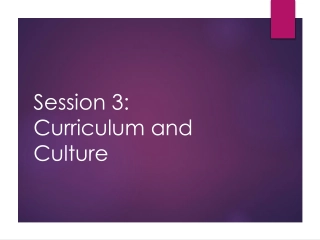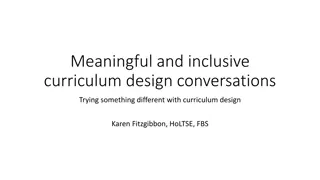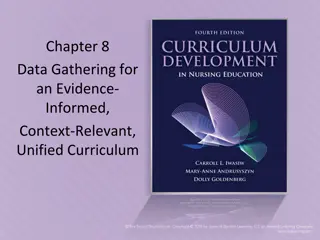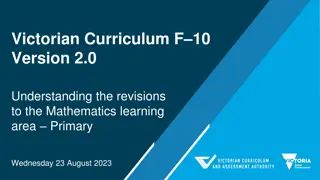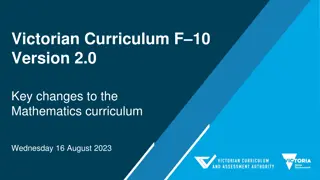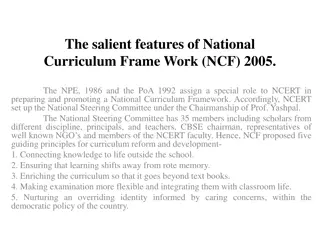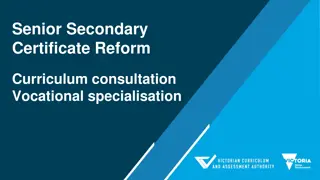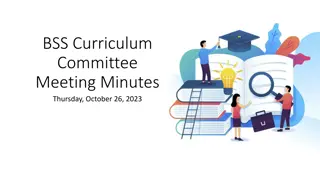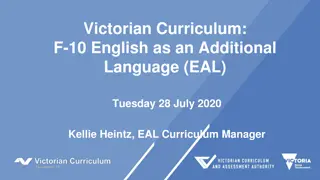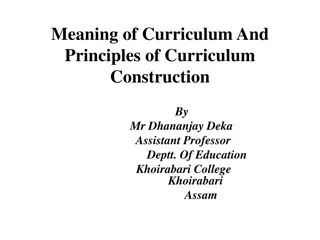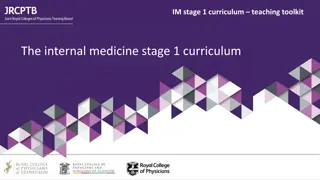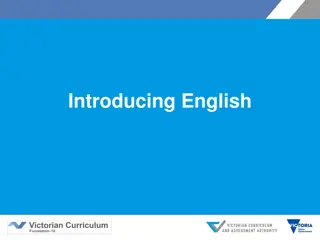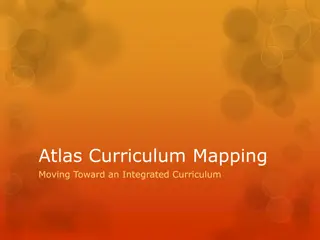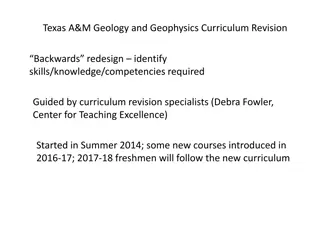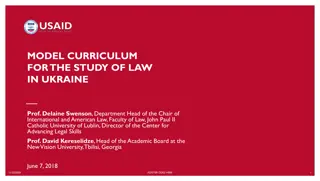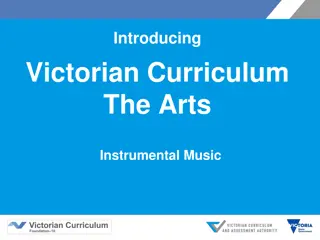Knowledge and Curriculum
Various forms of curriculum, the importance of curriculum, new trends in education, and the relationship between power and ideology in curriculum development. Understand the role of the state in curriculum development and the impact of meritocracy on the curriculum.
2 views • 16 slides
Knowledge and Curriculum
The principles of curriculum development to improve education quality, align curriculum with teaching methods, and meet student needs. Discover how innovative curriculum design influences learning outcomes and fosters independent thinking. Curriculum planners play a crucial role in creating effectiv
1 views • 21 slides
Session 3: Curriculum and Culture
The complex relationship between curriculum and culture, including how culture influences curriculum production, the cultural messages within curriculums, and who is advantaged or disadvantaged by the curriculum.
0 views • 17 slides
The Significance of Curriculum Development in Early Childhood Education_removed
Curriculum development process is vital in education, ensuring a suitable and engaging learning experience for early childhood education. It involves constantly improving and adapting the curriculum to meet the needs of children, bridging the gap between knowledge and reality expectations. Teachers
2 views • 1 slides
Unpacking the New ELAL Curriculum for Grades 4-6
In the spirit of reconciliation, acknowledgment of traditional Treaty lands in Alberta is highlighted, emphasizing the importance of understanding Indigenous history. The journey to the new curriculum is depicted along with the direction for curriculum development in Alberta, focusing on promoting s
1 views • 50 slides
Meaningful and inclusive curriculum design conversations
In a quest for meaningful and inclusive curriculum design, Karen Fitzgibbon explores a new approach to engage course teams in enhancing curriculum design. By addressing internal and external drivers for change, the aim is to facilitate inclusive conversations that promote learner-centered models and
1 views • 10 slides
Understanding Contextual Factors in Curriculum Development
This chapter delves into the significance of internal and external contextual factors in shaping curriculum development. It discusses the process of gathering essential contextual data, identifying relevant sources, and integrating data to create an evidence-informed, context-relevant, unified curri
5 views • 31 slides
Victorian Curriculum F-10 Version 2.0 Revision Overview
The Victorian Curriculum F-10 is undergoing revisions, with a focus on the Mathematics learning area for primary education. The curriculum acknowledges the traditional custodians of the land and aims to provide high-quality teaching resources aligned with Victorian standards. The VCAA, a statutory a
5 views • 51 slides
Overview of Victorian Curriculum F-10 Mathematics Curriculum Revisions
The Victorian Curriculum F-10 is being revised to incorporate content from the Australian Curriculum Version 9.0 with the aim of making it more manageable and aligned with Victorian priorities. The revisions focus on ensuring efficient implementation, strengthening student access to essential knowle
10 views • 23 slides
Overview of Victorian Curriculum F-10 Mathematics Revision
This document outlines key changes in the Victorian Curriculum F-10 Mathematics curriculum, including acknowledgments of the traditional custodians of the land, objectives alignment, what has not changed, and the timeline for implementation starting from 2024. The revisions aim to provide more manag
0 views • 43 slides
National Curriculum Framework (NCF) 2005 - Salient Features Summary
The National Curriculum Framework (NCF) 2005 outlines significant changes in education, focusing on connecting knowledge outside of school, moving away from rote memorization, enriching the curriculum beyond textbooks, making examinations more flexible, and nurturing an identity rooted in caring and
0 views • 7 slides
Evolution of Mathematical Theories and Proof Systems
Development of mathematical theories such as model theory, proof theory, set theory, recursion theory, and computational complexity is discussed, starting from historical perspectives with Dedekind and Peano to Godel's theorems, recursion theory's golden age in the 1930s, and advancements in proof t
1 views • 29 slides
Governance & the Curriculum Committee: Understanding Regulations and Structures for Effective Governance
This session explores the regulations and governance structures related to curriculum committees in colleges and districts, emphasizing the partnership between administration and academic senate. Key topics include establishing curriculum committees, examples of committee setups, and discussions on
2 views • 25 slides
Psychological Theories of Criminality: Understanding the Roots
Psychological theories of criminality delve into the association between intelligence, personality, learning, and criminal behavior. Major theories include Psychodynamic Theory by Freud, Behavioral Theory by Bandura, and Cognitive Theory by Kohlberg. These theories explore how unconscious mental pro
1 views • 20 slides
Understanding the Theory of Firms: Neoclassical vs. Modern Approaches
The theory of firms is explored through the Neoclassical and Modern perspectives. Neoclassical theory focuses on profit maximization, while Modern theory delves into managerial, principal-agent, and transaction cost theories. The discussion covers criticisms of Neoclassical theory and the essential
1 views • 79 slides
Theories of Causation in Psychological and Social Sciences
Overview of theories of causation categorized into psychological, social psychological, and sociological perspectives. Psychological theories focus on instinctive, biological, and psychological qualities of abusers, including Attachment Theory, Psychodynamic Theory, Social Learning Theory, and Situa
0 views • 15 slides
Understanding Political Theory through a Contextual Approach
Exploring G.H. Sabine's perspective on political theory through a contextual approach, emphasizing the importance of historical context and societal influences. Sabine argues that while political theory evolves with its contemporary politics, it should be analyzed within its specific time and social
0 views • 9 slides
Proposed Senior Secondary Certificate Reform Curriculum Consultation for Vocational Specialisation
A new curriculum is being proposed for vocational specialisation in senior secondary certificates in Victoria. The curriculum focuses on providing flexible pathways for students with standards-based assessments, offering courses aligned with students' needs and aspirations. Feedback on the draft cur
0 views • 19 slides
Evolution of Light Theory: From Wave Theory to Quantum Theory
At the turn of the century, the discovery of the photoelectric effect challenged the wave theory of light, leading to the development of the quantum theory by Max Planck and Albert Einstein. This new theory introduced the concept of discrete energy units known as quanta, bridging the gap between wav
1 views • 62 slides
Dp-branes, NS5-branes, U-duality, and M-Theory Overview
Overview of Dp-branes, NS5-branes, and U-duality derived from nonabelian (2,0) theory with Lie 3-algebra. Introduction to M-theory, including M2-branes and M5-branes in the strong coupling limit. Discussion on BLG theory, Lorentzian Lie 3-algebra, and the ABJM theory for M2-branes.
1 views • 32 slides
Recertification and Assessment of Core Curriculum Courses
The Core Curriculum Council of the Faculty Senate presents a process for recertification and assessment of core curriculum courses to maintain integrity and quality. Courses must be recertified every four years to ensure consistency amidst changes in instructors, content, and teaching methods. State
0 views • 33 slides
BSS Curriculum Committee Meeting Overview
The BSS Curriculum Committee Meeting discussed the need to update the curriculum process due to the increasing workload and impending retirement of key personnel. The meeting also compared curriculum processes in different divisions, highlighting the roles of faculty and staff in managing curriculum
0 views • 9 slides
Understanding Time-Independent Perturbation Theory in Quantum Mechanics
Perturbation theory is a powerful tool in solving complex physical and mathematical problems approximately by adjusting solutions from a related problem with known solutions. This theory allows for more accurate approximate solutions by treating the difference as a small perturbation. An example inv
0 views • 19 slides
Ethical Theories: Divine Command vs. Virtue Theory Explained
Divine Command Theory asserts that morality is derived from God's commands, contrasting with Virtue Theory which focuses on developing moral virtues to achieve human flourishing and excellence. Divine Command Theory relies on religious texts, while Virtue Theory emphasizes the cultivation of virtues
0 views • 24 slides
Importance of the New Victorian Curriculum F-10 EAL
The new Victorian Curriculum F-10 EAL aims to establish EAL as a standalone curriculum, provide a consistent structure across all learning areas, and recognize the diverse backgrounds and learning experiences of EAL students in Victoria. It also focuses on supporting the specific needs of EAL studen
0 views • 29 slides
Understanding Curriculum and Principles of Curriculum Construction
Curriculum is the core of the school system, facilitating the transmission of knowledge from teachers to students. It encompasses the courses, activities, and learning environment provided to pupils. Principles of curriculum construction include child-centeredness, individual differences, co-relatio
0 views • 8 slides
Understanding Fermi Liquid Theory in Interacting Fermion Systems
Fermi liquid theory, also known as Landau-Fermi liquid theory, is a theoretical model that describes the normal state of metals at low temperatures. Introduced by Landau and further developed by Abrikosov and Khalatnikov, this theory explains the similarities and differences between interacting ferm
0 views • 23 slides
Rutherford High School Curriculum Overview
Rutherford High School offers a comprehensive curriculum ranging from English to Mathematics. The curriculum night provides an overview of courses offered, course selection process, and graduation requirements. Students must complete four years of English and Mathematics, including specific assessme
0 views • 37 slides
Computational Learning Theory: An Overview
Computational Learning Theory explores inductive learning algorithms that generate hypotheses from training sets, emphasizing the uncertainty of generalization. The theory introduces probabilities to measure correctness and certainty, addressing challenges in learning hidden concepts. Through exampl
0 views • 43 slides
Automata Theory and Theory of Computation Overview
This course overview covers concepts in automata theory and theory of computation, including formal language classes, grammars, recognizers, theorems in automata theory, decidability, and intractability of computational problems. The Chomsky hierarchy, interplay between computing components, modern-
0 views • 42 slides
Overview of Victorian Curriculum Mathematics F-10
The Victorian Curriculum Mathematics F-10 provides a comprehensive framework for the development of mathematical skills from Foundation to Level 10, incorporating the Australian Curriculum while reflecting Victorian priorities and standards. It aims to equip students with essential numeracy skills f
0 views • 26 slides
Theories of Interest in Microeconomics II
Explore various theories of interest in economics, including the Classical Theory, Liquidity Preference Theory by Keynes, Productivity Theory, Abstinence Theory, Time-Preference Theory, Fisher's Time Preference Theory, and the Loanable Fund Theory. These theories offer different perspectives on the
0 views • 6 slides
Exploring the Evolution of Atomic Theory
Delve into the historical journey of atomic theory starting from Democritus and Aristotle's views to modern advancements proving some aspects of Dalton's theory incorrect. Learn about key laws and theories such as the Particle Theory of Matter, Dalton's Atomic Theory, and JJ Thomson's discoveries, s
0 views • 30 slides
Internal Medicine Stage 1 Curriculum Overview
This comprehensive guide details the Internal Medicine Stage 1 Curriculum, highlighting key components such as curriculum structure, curriculum changes, training pathways, specialty groups, and unchanged practices. The curriculum is designed to enhance training and assessment in areas like geriatric
0 views • 12 slides
Overview of Victorian English Curriculum
The Victorian Curriculum F-10, released in September 2015, serves as a foundational component of the Education State, aligning with the Australian Curriculum while reflecting Victorian priorities and standards. The English curriculum prioritizes language skills development through listening, reading
0 views • 9 slides
Enhancing Curriculum Development through Mapping for Schools
Curriculum mapping in schools involves using electronic tools to input, track, and analyze data related to curriculum, enabling stakeholders to meet standards, align content, collect real-time data on instruction, and reflect on practices for continuous improvement. Software programs like Rubicon At
1 views • 15 slides
Texas A&M Geology & Geophysics Curriculum Revision and Development
Involving a backward redesign led by curriculum revision specialists, the Texas A&M Geology and Geophysics curriculum has been undergoing changes since 2014. The revision aims to identify the necessary skills, knowledge, and competencies for students. It includes new courses introduced in 2016-17, w
0 views • 5 slides
Macromechanical Analysis of Lamina and Tsai-Hill Failure Theory Overview
The Tsai-Hill failure theory is based on the strengths of a unidirectional lamina, incorporating longitudinal and transverse tensile and compressive strengths, as well as in-plane shear strength. This theory, derived from the distortion energy theory, provides criteria for determining lamina failure
0 views • 15 slides
Model Curriculum for the Study of Law in Ukraine
This model curriculum outlines the structure and requirements for studying law in Ukraine. It covers mandatory and recommended courses in private law, public law, and criminal law, as well as assumptions underlying the curriculum. With a focus on theory/practice balance, electives/specializations, a
0 views • 14 slides
Victorian Curriculum in the Arts: An Overview
Explore the Victorian Curriculum framework for Instrumental Music and its integration with the Arts disciplines such as Dance, Drama, Media Arts, Music, Visual Arts, and Visual Communication Design. The curriculum provides a structured approach for teaching and learning across different year levels,
0 views • 28 slides


